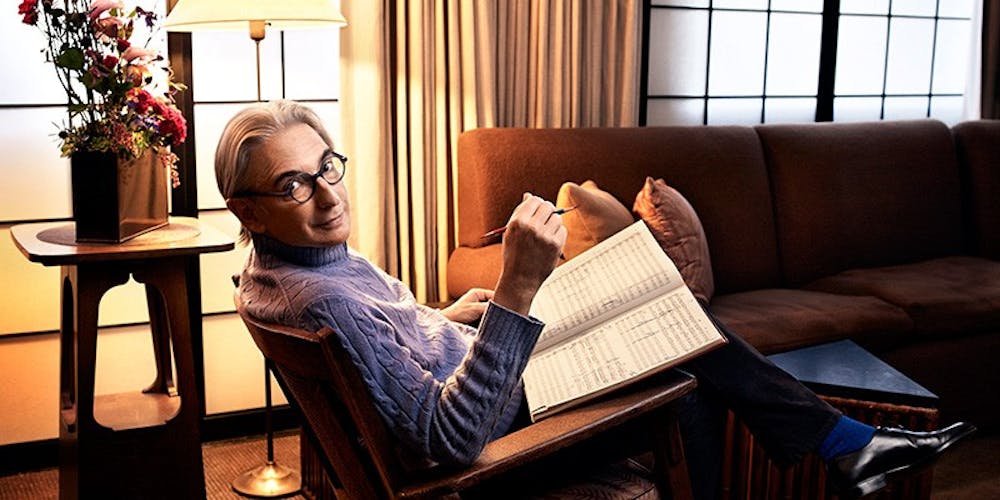“From the Diary of Anne Frank & Meditations on Rilke,” an album of two vocal works composed by Michael Tilson Thomas and produced by Jack Vad, was released by the SFS Media label in early 2020. The vocal pieces were performed by mezzo-sopranos Isabel Leonard and Sasha Cooke, as well as bass-baritone Ryan McKinny. On March 14, 2021, Tilson Thomas and the San Francisco Symphony (SFS) won a Grammy Award for Best Classical Compendium, marking the orchestra’s sixteenth such honor.
Tilson Thomas’s works, which reflect the overarching themes in his repertoire and life experiences, are worth revisiting again and again for their structural beauty and clarity of vision.
Interestingly, “From The Diary Of Anne Frank” is a piece for narrator and orchestra, originally commissioned by UNICEF and written for Audrey Hepburn but delayed due to a strike by SFS musicians. Tilson Thomas and Hepburn were close friends and musical partners who wanted to artistically create and imagine Anne Frank’s words from her historical diary, detailed during the Nazi occupation of the Netherlands.
Leonard and Cooke are able to bring out Anne Frank’s complex emotions with their spectacular performances. Beginning with a fresh, playful, and bright introduction from the violins, winds, and percussion, the orchestra enters the world of Anne Frank. Leonard’s passionate narration, including lines like “I wonder if it is because I haven’t been able to poke my nose outdoors for so long that I have become so crazy of everything to do with nature,” is accompanied by a lyrical violin solo and fluttery winds, most notably the flutes. Leonard effectively emphasizes and extends certain words to stress specific aspects of Anne Frank’s emotions. For example, “so” is emphasized, with almost a quiver in her voice to express the excitement of a young child. She extends the articulation of “crazy” and “everything” to express the intensity of Frank’s eagerness to go outside.
Alone, the chosen words that Leonard narrates are clear, direct, and expressive. Coupled with the emotions of Leonard’s storytelling, the audience can easily absorb and feel the direct meaningfulness of the lyrics. The orchestral accompaniment dies down, allowing Leonard’s resonant voice to articulate the emotions and thoughts of Anne Frank. It is almost as if Anne Frank is directly speaking to you from the past.
Often, the musical structure begins with the solo violinist playing the central musical theme and holding a chord with the accompanying winds, which allows the narrator to enter with crisp storytelling — “For in spite of everything, I still believe people are really good at heart.” When Leonard articulates the word “good,” the sound resonates from the inside of her throat.
“Meditations On Rilke,” on the other hand, is a song cycle based on lyric poems by Rainer Maria Rilke, a German modernist who explored the experiences and conditions of the human state through his work. “Meditations On Rilke” first premiered at Davies Symphony Hall with Cooke, McKinny, and the SFS, conducted by Tilson Thomas.
McKinny’s deep, smooth baritone voice spectacularly held a continuous line of phrasing as the strings entered majestically and the percussion bells rang soundly in the Davies Symphony Hall. McKinny’s rich, deep voice captured the essence of the musical composition, the underlying story and inspiration, and the chords in its resonance with the orchestra. As Tilson Thomas highlights, “it wasn’t just the songs, it was the world around the song — and parts of it go back to my earliest childhood and also allude to music that goes back into my 20s.”

According to Tilson Thomas, his song cycle is a transportative means of connecting with the person he was in his childhood and 20s before he entered the performance industry. In the orchestration, the vocalists of “Meditations On Rilke” are less so the center of attention, as compared to their singled-out, prominent voicing in “From The Diary Of Anne Frank.” In “Meditations On Rilke,” the orchestra has a strong presence and melody that complements the bold and belting voices of Cooke and McKinny.
The songs are quite simple and universal, in that Tilson Thomas takes directly from the text and makes the music digestible for the audience. Cooke likens Tilson Thomas’s writing and songs to Mahler’s composition style in the way that Tilson Thomas takes direct inspiration from the texts, like Rilke’s lyric poems. To reflect the core of the poem’s lines, his songs are melodic and meaningfully crafted. Often, harp and triangle, as well as the subtly moving texture from the winds, are the perfect supplement to Cooke’s beautiful and precise, yet strong, voice.
Tilson Thomas’s “From The Diary Of Anne Frank” and “Meditations On Rilke” are well-deserving of a 2021 Grammy Award. In many ways, the beauty of his composition is expressed in the way the different moving parts between the orchestra and singers fluidly and seamlessly hand off with each other. Through his composition and the chosen lyrics, Tilson Thomas is able to clearly communicate and connect with the audience, crafting a beautiful musical story for the listener.
Sophia Zheng is a Staff Writer for The Prospect who often covers topics related to art, music, culture, and society. She can be reached at syzheng@princeton.edu.









